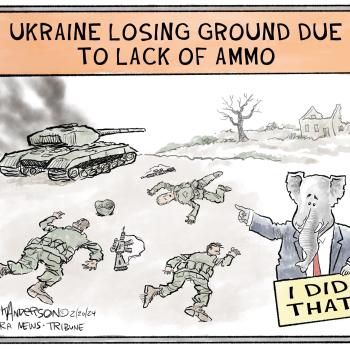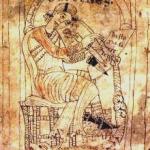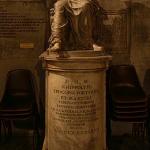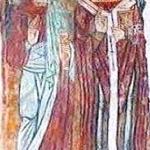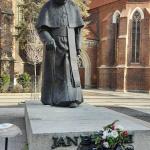“Do you know what I have done to you?” Jesus asked the Disciples after He washed their feet on the night before His crucifixion. With this action and these words He initiated the servant priesthood.
Nowhere is servant priesthood more evident than in places like war-torn Syria. Two Syrian bishops were kidnapped earlier this week while they were on a mission to try to save others. Their fate is still unknown.
I cannot imagine the feelings of a parish priest in a country where the bishops are kidnapped and the flock is either running for its life or facing unimaginable realities. The word “shepherd” takes on a whole new dimension in circumstances like these. When priests stay and do not run in times of peril, when they continue to bring the sacraments and simultaneously work alongside aid workers to provide for the everyday needs of their people, they bring current reality to shine on what happened in that upper room 2,000 years ago.
Zenit recently published an interview with a priest from Aleppo, Syria. Aleppo is the near the place where the two bishops were kidnapped. I think it’s worth reading because it shows us what a true priest does in times of death and terror to both himself and the people God has entrusted to his care.
From Zenit:
On Clinging to Christ and Serving the People of God
Aleppo, (Zenit.org) Robert Cheaib
A new escalation in the already untenable tension of the Syrian tragedy was reached Monday evening with the kidnapping of two bishops: Mar Gregorios Yohanna Ibrahim, Metropolitan of Aleppo of the Syro-Orthodox, and Mar Boulos el-Yazji, Orthodox Metropolitan of Aleppo.
A new burden of fear and of the unknown was laid on the already afflicted hearts of Syrian Christians.
What will happen after this new crossroads? ZENIT interviewed a priest who perseveres in his land and in his parish in Aleppo. To protect his safety and that of his relatives and of his community, the priest’s interview is published anonymously. He himself said to us: “My name is not important. What is important is that the voice and witness, the suffering and the hope of Christians is proclaimed.”
We wished to hear from him about the echoes of daily life in the shadow of the unknown, in the shadow of what he described as “organized” and systematic “disorder.” What surprised us was to learn that despite the dark and black cloud that hovers over the Syrian situation, there is, nevertheless, a glimmer of hope that does not stem from naïve optimism, but from a look of faith rooted in the words – which have now become experience – of Saint Paul: “Who will separate us from the love of Christ? Will affliction, or anguish, or persecution, or hunger, or nakedness, or danger, or the sword? In fact, as he wrote: Because of you we are put to death daily, we are treated as sheep for the slaughter. But in all these things we are more than victorious in virtue of Him who has loved us.”
This cry of hope is not aesthetic lyricism, but a daily reality that is translated into a conscious choice: to stay, not for the land but for the people of God who – as Saint Augustine says – are making their historic pilgrimage “amid the persecutions of the world and the consolations of God.”
ZENIT: The war has imposed an “emergency calendar.” As a priest, what is your daily program?
Father N: In the present situation, pastoral work as we always lived it is suspect. It has become an endeavor of humanitarian aid. The pastoral visits and the various activities have taken on a different style precisely to respond to the present emergency situation. For instance, with the collaboration of the Syrian Committee for Development, we have transformed two schools into a place of reception for Muslim refugees, precisely to show that the Church is at the service of man, of every man, regardless of his ethnic or religious membership.
As regards the works of charity and relief of suffering, we collaborate closely as a parish with the Red Cross and with Caritas.
In any case, we continue to celebrate Mass in areas that are still inhabited, and we notice an increase in the daily frequentation of the faithful. Christians have begun to seek hope more, which comes from Christ risen from the dead!
I must stress also that very many priests are committed in a stable way beside the laity in the service of material support in the parishes and dioceses. (Read the rest here.)








